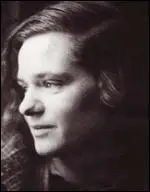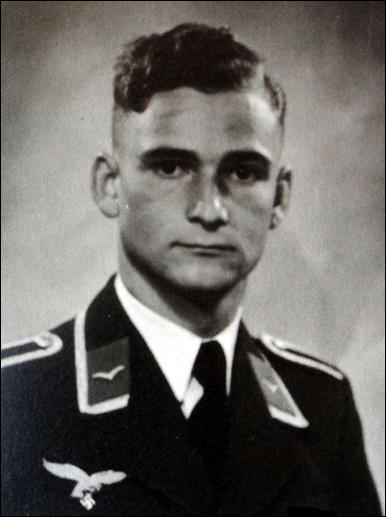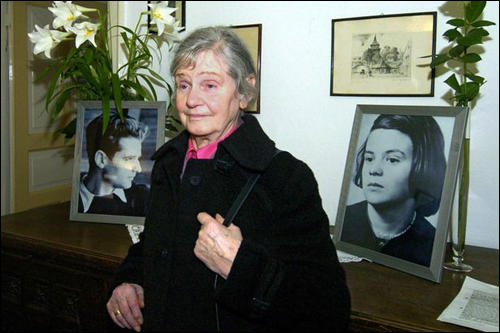Elisabeth Scholl

Elisabeth Scholl, the daughter of Robert Scholl and Magdalena Scholl, was born in Forchtenberg in 1920. Elisabeth was very close to her sisters and brothers, Inge (b. 1917) Hans (b. 1918), Sophie (b. 1921), Werner (b. 1922) and Thilde (b. 1925). "The Scholl children were seldom seen tumbling about the streets and were never heard singing improper songs in public. A close-knit clan with a strong sense of each other, they usually provided themselves with enough companionship to make a presence of outsiders unnecessary." (1)
Her father was elected mayor of Forchtenberg. Over the next few years he managed to get the railway extended to the town. He also had a community sports centre built in Forchtenberg but he was considered to be too progressive for some and in 1930 he was voted out of office. (2)
The family moved to Ulm in 1932. "Robert Scholl had lived in several small towns in Swabia, an area of south-west Germany known for its rural charms, thrifty people, and spirit of independence, before settling in Ulm, where he opened his own office as a tax and business consultant. He was a big, rather heavyset man, with strong opinions and an unwillingness, if not an inability, to keep those opinions to himself." (3)
Elisabeth, like her sisters, Inge School and Sophie Scholl, joined German League of Girls (BDM) in 1933, whereas her brothers, Hans Scholl and Werner Scholl joined the Hitler Youth. Their father disapproved of Adolf Hitler. "My father had a pacifist conviction and he championed that. That certainly played a role in our education. But we were all excited in the Hitler youth in Ulm, sometimes even with the Nazi leadership." (4)
Elisabeth Scholl and Nazi Germany
The historian, Richard F. Hanser, has pointed out: "The Scholl children, all five of them - Inge, Hans, Elisabeth, Sophie, and Werner - needed no government propaganda to urge them to love their country. Like most children everywhere, they were patriotic by instinct, and the country they loved was their immediate surroundings." (5)
Robert Scholl claimed that Hitler 's attempt to reduce unemployment by military spending would result in war: "Have you considered how he's going to manage it? He's expanding the armaments industry, and building barracks. Do you know where that's all going to end." (6) Elisabeth later pointed out why they rejected their father's advice: "We just dismissed it: he's too old for this stuff, he doesn't understand. My father had a pacifist conviction and he championed that. That certainly played a role in our education. But we were all excited in the Hitler youth in Ulm, sometimes even with the Nazi leadership." (7)
Hans Scholl was the first to question the ideology of the Nazi Party. Hans chosen to be the flag bearer when his unit attended the Nuremberg Rally in 1936. His sister, Inge Scholl, later recalled: "His joy was great. But when he returned, we could not believe our eyes. He looked tired and showed signs of a great disappointment. We did not expect any explanation from him, but gradually we found out that the image and model of the Hitler Youth which had been impressed upon him there was totally different from his own ideal... Hans underwent a remarkable change... This had nothing to do with Father's objections; he was able to close his ears to those. It was something else. The leaders had told him that his songs were not allowed... Why should he be forbidden to sing these songs that were so full of beauty? Merely because they had been created by other races?" (8)
Shortly after Hans returned from Nuremberg, an important BDM leader arrived from Stuttgart to conduct an evening of ideological training for the girls in Ulm. When the members were asked if they had any preferences for discussion, Sophie Scholl suggested they read poems by Heinrich Heine, one of her favourite writers. The leader was appalled and pointed out that the left-wing, anti-war, Jewish writer, had his books burned and banned by Propaganda Minister Joseph Goebbels in 1933. Apparently, Sophie replied, "Whoever doesn't know Heine, does not know German literature." (9) Elisabeth argued that all the Scholl children gradually became hostile to the government: "First, we saw that one could no longer read what one wanted to, or sing certain songs. Then came the racial legislation. Jewish classmates had to leave school." (10)
Hans Scholl and some of his friends decided to form their own youth organization. Inge Scholl later recalled: "The club had its own most impressive style, which had grown up out of the membership itself. The boys recognized one another by their dress, their songs, even their way of talking... For these boys life was a great, splendid adventure, an expedition into an unknown, beckoning world. On weekends they went on hikes, and it was their way, even in bitter cold, to live in a tent... Seated around the campfire they would read aloud to each other or sing, accompanying themselves with guitar, banjo, and balalaika. They collected the folk songs of all peoples and wrote words and music for their own ritual chants and popular songs." (11)
At the age of nineteen, every German, male or female, had to spend six months on a construction project or a farm. The National Labour Service was an attempt to keep the young under the supervision of government agencies as long as possible. It also removed thousands from the labour market and therefore reduced the unemployment statistics and kept young people off the streets where they might cause trouble. (12) Hans Scholl was assigned to road building near a place called Göppingen. The project was part of the Autobahn system, the network of roads across Germany, which was one of Hitler's most valued programs. (13)
Six months of National Labour Service was followed by conscription into the German Army. Hans always loved horses and he volunteered and was accepted for a cavalry unit in 1937. A few months later he was arrested in his barracks by the Gestapo. Apparently, it had been reported that while living in Ulm he had been taking part in activities that were not part of the Hitler Youth program. Sophie, Inge and Werner Scholl were also arrested. (14)
As Sophie was only sixteen, she was released and allowed to go home the same day. One biographer has pointed out: "She seemed too young and girlish to be a menace to the state, but in releasing her the Gestapo was letting slip a potential enemy with whom it would later have to reckon in a far more serious situation. There is no way of establishing the precise moment when Sophie School decided to become an overt adversary of the National Socialist state. Her decision, when it came, doubtless resulted from the accretion of offences, small and large, against her conception of what was right, moral, and decent. But now something decisive had happened. The state had laid its hands on her and her family, and now there was no longer any possibility of reconciling herself to a system that had already begun to alienate her." (15)
The Gestapo searched the Scholl house and confiscated diaries, journals, poems, essays, folk song collections, and other evidence of being members of an illegal organisation. Inge and Werner were released after a week of confinement. Hans was detained three weeks longer while the Gestapo attempted to persuade him to give damaging information about his friends. Hans was eventually released after his commanding officer had ensured the police that he was a good and loyal soldier. (16)
Sophie Scholl's arrest had a big impact on her political thinking. Elisabeth remembers a conversation she had with Sophie in the summer of 1939: "As time went on Sophie became increasingly disillusioned with the Nazis. On the day before England declared war in 1939 I went with her for a walk along the Danube and I remember I said: Hopefully there will be no war. And she said: Yes, I hope there will be. Hopefully someone will stand up to Hitler. In this she was more decisive than Hans." (17)
Arrest and Execution of Hans and Sophie Scholl
On the outbreak of the Second World War, Sophie's boyfriend Fritz Hartnagel, was serving in the German Army and a loyal supporter of Adolf Hitler. She wrote to him expressing her bitterness: "Now you'll surely have enough to do. I can't grasp that now human beings will constantly be put into mortal danger by other human beings. I can never grasp it, and I find it horrible. Don't say it's for the Fatherland." (18)

During the war Elisabeth Scholl became a children's nurse. On 23rd February, 1943, was waiting at a bus-stop when she glanced at the headline of the Voelkischer Beobachter. The headline, nearly made her faint as it was news that her brother and sister, Hans Scholl and Sophie Scholl, and a family friend, Christoph Probst, had been beheaded for high treason. They had all been found guilty of distributing anti-Nazi leaflets. (19)
A few days after Sophie and Hans were executed, Elisabeth, along with her father, mother, and sister, Inge, were arrested. They were all put into solitary confinement. "For Elisabeth, this meant a bare cell with just a jug of water, a Bible and a cellar of salt. She was held for two months under wretched conditions, freed only when she contracted a kidney and bladder infection." (20)
In August 1943, they were tried and although Robert received a two-year sentence, the women were found not guilty. (21) Elisabeth later recalled: "We were outcasts. Many of my father's clients - he was a tax accountant - wanted to have nothing more to do with the family. It was always nothing personal - just because of the business. Passers-by took to the other side of the road." (22)
With the arrival of Allied troops Robert Scholl was released and appointed mayor of Ulm. (23) On his return from the war Fritz Hartnagel, the former boyfriend of Sophie Scholl, helped Elisabeth to get a job. It was the begining of a romance that led to marriage and the birth of four sons. (24) They both became active in the peace movement and gave advice to youthful conscientious objectors. (25)
In January 2014, the 93 year-old Elisabeth Hartnagel-Scholl, gave an interview to the world's media. As the Daily Mirror pointed out: "Now she is the only one of five Scholl children left alive. Her other brother Werner was an army medic who vanished on the eastern front. Her other sister Inge died in 1998. Though she was shunned by many Germans after the executions, Elisabeth went on to marry her sister’s devastated boyfriend and enjoy a long and happy marriage before his death in 2001". (26)

Hans and Sophie Scholl (January 2014)
Primary Sources
(1) The Daily Mail (18th January, 2014)
It was a cold winter's day in 1943 when three students threw a pamphlet into the stairwell at Munich's Ludwig Maximillian university, the last of six they had distributed decrying Nazism.
The young activists wanted to call attention to the crimes being committed in Russia in their name - the mass shootings of Jews, the burning of villages, the barbarity of the war Hitler proclaimed to be 'without rules' in his bid to crush the Slavic 'subhumans.'
And their writings recounted the heavily suppressed story of how the Wehrmacht had been stunningly defeated at Stalingrad a month earlier - a battle which proved the turning point of the war.
But, unbeknownst to them, a janitor at the university spotted their surreptitious leaflet drop and reported them to the Gestapo, the Hitler regime's feared secret police.
Twenty-four hours later, they were under arrest and, within days Sophie Scholl, her brother Hans, 24, and their friend Christoph Probst, also 24, were all beheaded for treason.
Now, 71 years later, the guillotine used to carry out the gruesome sentence has been found gathering dust in the basement of a Munich museum, triggering a debate in Germany about whether it should go on show, or remain locked out of sight forever.
For one elderly woman in particular it has pulled into sharp focus all the pain, anguish and terror she experienced over seven decades ago when her younger sister and elder brother went bravely to their deaths.
Elisabeth Hartnagel-Scholl is the last surviving sibling of Hans and Sophie Scholl, two of the young martyrs who dared to challenge the world's most sinister tyranny and paid the ultimate price in doing so.
Now a 93-year-old widow, she lives alone in Stuttgart, but she clearly remembers the day that she discovered her brother and sister had died beneath the flashing blade of the guillotine.
(2) Daily Mirror (17th January, 2014)
Children’s nurse Elisabeth Scholl was drinking a cup of coffee on a cold day in February as she waited for a bus. As she sipped she glanced at a newspaper. And the front-page headline almost made her faint.
This was Nazi Germany in 1943, the newspaper was a propaganda sheet called Voelkischer Beobachter – the People’s Observer – and the news filled Elisabeth, only 22, with disbelief, shock and pain.
It reported how her sister Sophie, her brother Hans and their friend Christoph Probst had all been guillotined the previous day – beheaded for high treason.
Now, 71 years later, that guillotine has come to light in the basement of a Munich museum. It has triggered a debate in Germany about whether such a hideous instrument should go on display in memory of Sophie and her fellow resisters.
For Elisabeth Hartnagel-Scholl, now 93, the discovery has brought memories flooding back. Now she is the only one of five Scholl children left alive. Her other brother Werner was an army medic who vanished on the eastern front. Her other sister Inge died in 1998. Though she was shunned by many Germans after the executions, Elisabeth went on to marry her sister’s devastated boyfriend and enjoy a long and happy marriage before his death in 2001.
“It was February 23 1943 when I read my brother and sister were no longer alive,” said Elisabeth at her home in Stuttgart. “They had been executed the day before in Stadelheim prison near Munich.”
Sophie, 21, Hans 24, and Christoph, 24, were members of resistance group called White Rose. Their crime was to distribute leaflets listing Nazi crimes in Russia and the crushing defeat of the Germany Sixth Army at Stalingrad the previous month – a turning point in the Second World War.
A leaflet they threw into a stairwell of Munich’s Ludwig Maximillian University was the last of six. But they were seen by the janitor, reported to the Gestapo and arrested within 24 hours. After four days they went before a rabidly Nazi judge and were executed the same day.
Student Activities
Kristallnacht (Answer Commentary)
Adolf Hitler's Early Life (Answer Commentary)
Heinrich Himmler and the SS (Answer Commentary)
Trade Unions in Nazi Germany (Answer Commentary)
Adolf Hitler v John Heartfield (Answer Commentary)
Hitler's Volkswagen (The People's Car) (Answer Commentary)
Women in Nazi Germany (Answer Commentary)
German League of Girls (Answer Commentary)
